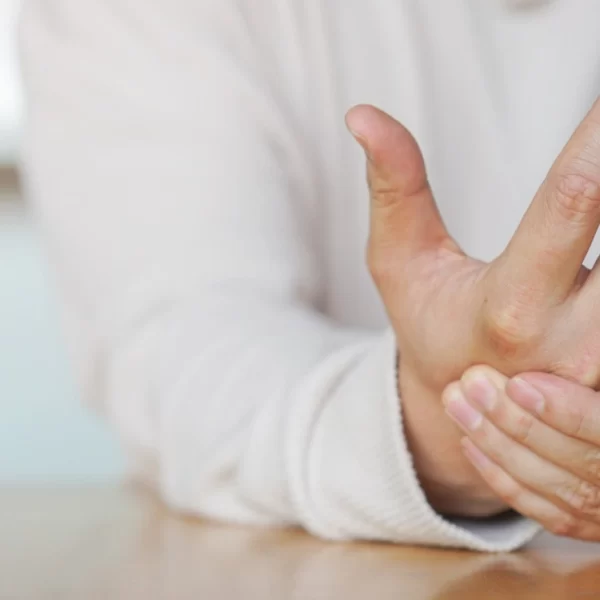Can Alcohol Cause Tremors?

Alcohol consumption isn’t uncommon, but its impact on the body can be surprising, especially when it comes to its effect on our nervous system.
One of the less talked about side effects of alcohol consumption, particularly from heavy drinking, is the development of tremors.
Understanding Alcohol Tremors
Alcohol tremors, also known as alcohol shakes, can be defined as involuntary muscle movements involving back-and-forth movements of one or more parts of the body. They can occur in various body parts but are most commonly seen in the hands and typically begin roughly 6 hours after the last alcoholic drink.
These tremors are a physical indicator of the body experiencing alcohol withdrawal symptoms. This happens because the central nervous system becomes hyperactive during alcohol withdrawal, leading to various symptoms, including tremors.
In severe cases, alcohol tremors may be accompanied by other symptoms of acute alcohol withdrawal, such as when an individual is experiencing delirium tremens. Other withdrawal symptoms of alcohol withdrawal may include sweating, a rapid heartbeat, high blood pressure, insomnia, nausea, and anxiety.
The Connection Between Alcohol and Tremors
Alcohol can cause tremors in several ways, both directly and indirectly, through its effects on the brain and nervous system.
- Alcohol Withdrawal: More commonly, tremors related to alcohol use are seen during withdrawal, when the body reacts to the absence of alcohol after a period of heavy drinking. These are known as “withdrawal tremors” or “the shakes” and are a symptom of alcohol withdrawal syndrome.
- Short-term Effects: After drinking, some individuals may notice a temporary tremor as the alcohol starts to affect the brain (also known as hangover shakes). It occurs because alcohol is a central nervous system depressant, slowing down brain function and altering the communication between the brain and the body. This disruption can lead to temporary shaking or trembling.
- Long-term Effects (Physical Dependence): Chronic heavy drinking or living with alcohol use disorder can lead to a condition known as alcohol-related tremor or even worsen other types of tremor, such as essential tremors. Long-term alcohol abuse can contribute to the development of a physical dependence on alcohol, where the body requires the substance to function normally.
Recognising the Signs of Alcohol-Related Tremors
It’s important for individuals (and their loved ones) to recognise the signs of physical alcohol dependence or alcohol-related tremors. These can include (but are not limited to):
- Hangover shakes or tremors: You might find that you experience alcohol shakes as part of a hangover or after periods of not drinking. This is a common symptom of withdrawal as your body adjusts to the absence of alcohol.
- Difficulty with fine motor skills: Anything that requires precise hand coordination, such as writing, typing, or buttoning clothes, has become noticeably harder for you.
- Sweating and rapid heart rate: This is commonly seen in those with alcohol use disorder. You might experience excessive sweating and a faster heartbeat, especially during alcohol shakes. These symptoms can occur together, which may mean your body’s having a stress response to alcohol withdrawal.
- A physical and mental health decline: Alongside physical symptoms, emotional signs such as heightened anxiety, irritability, or mood swings. These emotions can sometimes cause tremors.
- Sleep disturbances: Trouble falling asleep, staying asleep, or experiencing restful sleep are common.
- Sensitivity to light and sound: An increased sensitivity to things such as bright lights and loud noises can accompany alcohol-related tremors, making everyday environments feel overwhelming.
- Craving alcohol to relieve symptoms: If you find yourself craving alcohol or drinking alcohol as a way to reduce or manage these tremors, it’s a significant sign of dependence.
Are Alcohol-Related Tremors Permanent?
In most cases, no. However, severe and prolonged alcohol abuse can lead to more serious conditions, such as alcohol-related brain damage (ARBD), which can include permanent neurological damage and conditions like Wernicke-Korsakoff syndrome.
Chronic memory disorders characterise this syndrome, and in such cases, some symptoms, including tremors, may become persistent or permanent due to irreversible damage to the brain.
The best way to prevent alcohol tremors from becoming permanent is through recognising that alcohol addiction is present, early intervention, a medically monitored alcohol detox, psychological treatment for alcohol misuse, and support in maintaining abstinence in recovery.
What to Do About Alcohol-Related Tremors
The good news is that most alcohol-related tremors can be managed and even reversed with the right approach.
Here are some steps to consider:
- Consult with a professional: If you suspect that your tremors are related to alcohol use and are worried you might have developed a physical dependence, seek professional medical advice on what the next steps may look like for you.
- Gradual reduction: If there’s an alcohol addiction present, suddenly stopping alcohol consumption can be dangerous. This is especially true for those who engage in excessive alcohol use, as it can lead to delirium tremens. A medical professional can guide a gradual reduction in alcohol intake.
- Lifestyle changes: Incorporating healthy lifestyle changes, such as a balanced diet, regular exercise, and stress management techniques, can help reduce tremors and improve overall well-being.
- Lean on support systems: Support from friends, family, and support groups(e.g. Alcoholics Anonymous) can provide encouragement and accountability during the recovery process.
Find Support for Alcohol Dependence Today
For anyone worried about alcohol addiction, experiencing alcohol tremors, or other symptoms of alcohol withdrawal, we can help. Our team are highly experienced in treating alcohol withdrawal symptoms and dependence, and we tailor treatment programmes based on your unique requirements and situation.
If you would like to talk about how we can help you, please reach out to us directly today, and a member of our team will support you through the next steps.

 09th February 2024
09th February 2024  N/A
N/A
 United Kingdom
United Kingdom  Richmond Drive, Watford, WD17 3BG
Richmond Drive, Watford, WD17 3BG 

 Spain
Spain